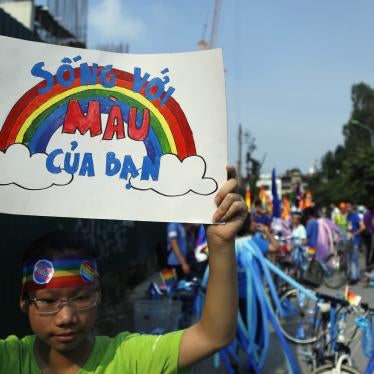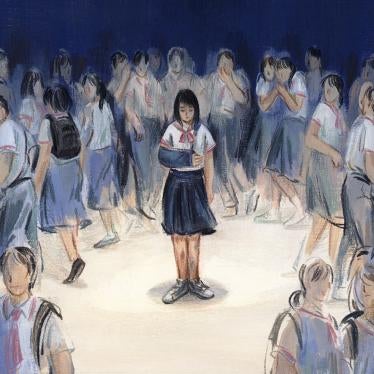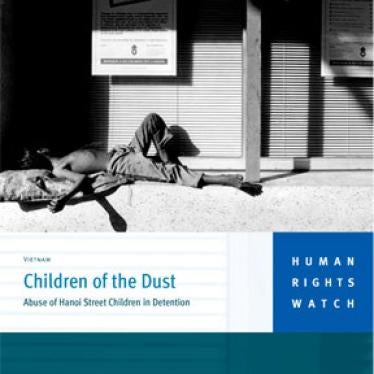This submission focuses on the topic of violence and discrimination against lesbian, gay, bisexual, and transgender (LGBT) youth, the protection of students, teachers, and schools during time of armed conflict, and violence against children. It proposes issues and questions that Committee members may wish to raise with the government.
- LGBT Youth (Articles 2, 13, 17, 19, 24, 28 and 29)
Verbal harassment and bullying
Human Rights Watch has documented discrimination and violence against LGBT youth at home and at school between 2018 and 2019. Pervasive yet incorrect myths about sexual orientation and gender identity in Vietnam, such as the false belief that same-sex attraction is a diagnosable and curable mental health condition, have had a particularly harsh impact on LGBT youth.[1]
Students in different types of schools—rural and urban, public and private—told Human Rights Watch that many students and teachers verbally harass LGBT students, using derogatory words to refer to LGBT people, sometimes targeted at them and coupled with threats of violence. Research by UN agencies and Vietnamese groups confirm this finding.[2] In a 2014 report, the UN Development Programme (UNDP) noted: “education institutions are not safe for LGBT students due to the lack of anti-bullying and non-discrimination policies. Furthermore, sex and sexual orientation and gender identity education is still limited in Vietnam and are considered sensitive topics that teachers usually avoid.”[3]
LGBT youth who face bullying and exclusion at school suffer a range of negative impacts. They feel stressed due to the bullying and harassment they experience, and the stress affects their ability to study.[4] Some students said the bullying they faced due to their sexual orientation or gender identity led them to skip or stay home from school, thus depriving them of their education.[5]
Schools sometimes fail to protect students from physical violence. What is similar between the cases of verbal and physical abuse is the lack of consistent response from school staff, and the lack of confidence among students that there are mechanisms in place to address cases of violence and discrimination. Teachers are often untrained and ill-equipped to handle cases of anti-LGBT discrimination, and their lessons frequently uphold the widespread myth in Vietnam that same-sex attraction is a disease.
Human Rights Watch recommends that the Committee ask Vietnam to:
- Issue a directive instructing schools on specific measures to take to prevent and combat harassment and discrimination, including specifically on the basis of sexual orientation and gender identity, in school;
- Invite the United Nations independent expert on protection against violence and discrimination based on sexual orientation and gender identity to visit Vietnam and consult on the government’s LGBT rights progress and next steps;
- Revise the 2006 Law on Gender Equality to include specific protections for gender identity and expression;
- Ratify the UNESCO Convention Against Discrimination in Education.
- Inadequate Sexuality Education in Schools (Articles 24 and 28)
To date, Vietnam’s sex education policies and practices fall short of international standards and do not include discussion of sexual orientation and gender identity. The central curriculum for schools is also silent on LGBT issues. While some teachers and schools take it upon themselves to include such lessons, the lack of national-level inclusion leaves the majority of students in Vietnam without the basic facts about sexual orientation and gender identity.
That omission is proving to be harmful. Youth are aware of the pervasive, but incorrect, belief that same-sex attraction is a diagnosable mental health condition.[6] The failure of the Vietnamese government to counter this false information has let it continue unabated. This had significant negative consequence for young LGBT people Human Rights Watch interviewed, ranging from serving as the root of harassment and discrimination, to parents bringing their children to mental health professionals in search of a cure. Even youth who would eventually identify themselves as queer acknowledged that they grew up on stereotypes and misinformation about themselves and others. In some cases, these misunderstandings fueled antipathy and even violence against LGBT people.
Human Rights Watch recommends that the Committee ask the government of Vietnam:
- Can the government provide details on how it plans to implement the guidelines for comprehensive sexuality education that the Ministry of Education and Training developed in 2019?
- Can the government of Vietnam explain how it is undertaking to communicate to the public that same-sex attraction is a natural variation of human sexuality and not a diagnosable mental health condition?
Human Rights Watch recommends that the Committee ask Vietnam to:
- Promote and implement guidelines for teaching comprehensive sexuality education in line with international standards;
- Immediately provide mandatory short-term training for all teachers on gender and sexuality, including sexual health, and accurate information on sexual orientation and gender identity;
- Include modules on sexual orientation, gender identity, and human rights in the curriculum for pedagogical colleges and universities;
- Sign UNESCO’s Call for Action on homophobic and transphobic violence to signal the ministry’s commitment to policy reform to protect LGBT students.
- Protecting Students, Teachers, and Schools During Armed Conflict (Articles 28, 38, 39)
In October 2019, Vietnam became the 97th country to endorse the Safe Schools Declaration and thereby commit to using the Guidelines for Protecting Schools and Universities from Military Use during Armed Conflict as practical guidance during military operations.
As of January 31, 2020, Vietnam was contributing 63 troops and 6 staff officers to UN peacekeeping operations around the world.[7] Such troops are required to comply with the UN Department of Peacekeeping Operations “UN Infantry Battalion Manual” (2012), which includes the provision that “schools shall not be used by the military in their operations.”
Human Rights Watch recommends that the Committee ask the government of Vietnam:
- Are protections for schools from military use included in the pre-deployment training provided to Vietnamese troops participating in peacekeeping missions?
- Do any Vietnamese laws, policies, or trainings provide explicit protection for schools and universities from military use during armed conflict?
Human Rights Watch recommends that the Committee:
- Commend Vietnam for its endorsement of the Safe Schools Declaration and the Guidelines for Protecting Schools and Universities from Military Use during Armed Conflict;
- Encourage Vietnam to continue to develop and share examples of its implementation of the Declaration’s commitments with other countries that have endorsed the Safe Schools Declaration and with the Committee as examples of good practice in protecting students, teachers, and schools during armed conflict;
- Encourage other Association of Southeast Asian Nations (ASEAN) countries to endorse the declaration.
- Abuse of Children (Article 19)
Violence against children, including sexual abuse, is pervasive in Vietnam. Cases of serious violence occur in homes, at schools, and in public spaces across the country and are often reported frequently on state media. Vietnamese media often feature horrendous accounts of abuse: strangling and hitting, whipping, hard slapping, and multiple reports in the last year alone of parents or teachers beating children or hitting children with sticks, as well as numerous accounts of sexual abuse, including by government caregivers or teachers. Slapping or hitting children at home or in school can be commonly observed in public or domestic settings.
A 2017 UNICEF statement, citing surveys in 2014, noted that “Violent discipline is wide-spread with almost 68.4 per cent of children aged 1-14 reported as experiencing some form of violence at home by their parents or caregivers.[8] Around 20 percent of girls and boys aged eight reported being physically punished in school.” The Ministry of Labour, Invalids and Social Affairs (MOLISA) reported 7,829 cases of abuse against children in the period between January 2015 and June 2019. Officials in January 2020 indicated that an estimated 80 percent of reported abuse in recent years was sexual. Far more cases go unreported. During a BBC roundtable in 2017, a UNICEF official cited deeply set social stigmas in Vietnamese culture as a factor preventing witnesses or victims from reporting abuse.
Vietnamese authorities have recognized the seriousness and scope of abuse against children and have taken some steps to address it. In December 2017, authorities announced the launch of a national hotline for reporting abuse against children, and in December 2019, the government issued a five-year National Action Plan to prevent and combat abuse against children. The plan aims to improve awareness of child abuse issues among children and families, including through media outreach and public campaigns; enhance skills of social workers, teachers, and education staff to prevent abuse; improve medical assistance to abused children; and improve training of police to better respond to reports of abuse.
The plans announced by the Vietnamese authorities represent an important step but are largely general and the proposed measures are insufficient in scope.
Human Rights Watch recommends that the Committee ask the government of Vietnam:
- Can the government of Vietnam provide details on how authorities plan to implement the steps outlined in the National Action Plan, especially about plans for public campaigns and trainings for educational staff, police, and other officials?
- Can the government of Vietnam provide details on how it plans to measure whether it is reducing violence against children?
Human Rights Watch recommends that the Committee commend the government of Vietnam for its pledges on improving action on child abuse, and urge authorities to:
- Reconsider its definition of child abuse under Vietnamese law and policies to include a broader range of forms of mistreatment, including verbal, mental, and emotional abuse, bullying, threats, and lower-impact corporal punishment;
- Launch a national campaign on child abuse to educate adults and students about child abuse and its effects on health, and the penalties applicable to those committing child abuse;
- Accelerate plans to provide mandatory training on child abuse issues for all teachers and staff members at daycare centers, pre-schools, and K-12 schools, as well as anti-abuse training to parents expecting children;
- Accelerate plans to train police and consider inviting international experts to help provide training to improve responses to reports of abuse and foster a better environment for reporting of abuse;
- Add mandatory anti-abuse training in all government and party-run organizations.
[1] Human Rights Watch, “My Teacher Said I Had a Disease”: Barriers to the Right to Education for LGBT Youth in Vietnam, February 12, 2020, https://www.hrw.org/report/2020/02/12/my-teacher-said-i-had-disease/barriers-right-education-lgbt-youth-vietnam (accessed February 16, 2020).
[2] UNDP and USAID, Being LGBT in Asia: Viet Nam Country Report, 2014, https://www.usaid.gov/sites/default/files/documents/1861/Being_LGBT_in_Asia_Viet_Nam_report_ENG.pdf (accessed February 16, 2020); Lương Thế Huy and Phạm Quỳnh Phương, “Is it because I am LGBT?”: Discrimination based on sexual orientation and gender identity in Viet Nam, The Institute for Studies of Society, Economy and Environment (iSEE), February 2016, https://www.vn.undp.org/content/vietnam/en/home/library/democratic_governance/is-it-because-i-am-lbgt.html (accessed February 16, 2020).
[3] UNDP and USAID, Being LGBT in Asia: Viet Nam Country Report, 2014, https://www.usaid.gov/sites/default/files/documents/1861/Being_LGBT_in_Asia_Viet_Nam_report_ENG.pdf (accessed February 16, 2020).
[4] Human Rights Watch, “My Teacher Said I Had a Disease”: Barriers to the Right to Education for LGBT Youth in Vietnam, February 12, 2020, https://www.hrw.org/report/2020/02/12/my-teacher-said-i-had-disease/barriers-right-education-lgbt-youth-vietnam (accessed February 16, 2020).
[5] Ibid.
[6] Human Rights Watch, “My Teacher Said I Had a Disease”: Barriers to the Right to Education for LGBT Youth in Vietnam, February 12, 2020, https://www.hrw.org/report/2020/02/12/my-teacher-said-i-had-disease/barriers-right-education-lgbt-youth-vietnam (accessed February 16, 2020).
[7] United Nations Department of Peacekeeping Operations, Contributors to UN Peacekeeping Operations by Country and Post Police, UN Military Experts on Mission, Staff Officers and Troops, https://peacekeeping.un.org/en/troop-and-police-contributors
[8] “Violent discipline, sexual abuse and homicides stalk millions of children worldwide,” UNICEF, November 1, 2017, https://www.unicef.org/vietnam/press-releases/violent-discipline-sexual-abuse-and-homicides-stalk-millions-children-worldwide (accessed February 26, 2020).








